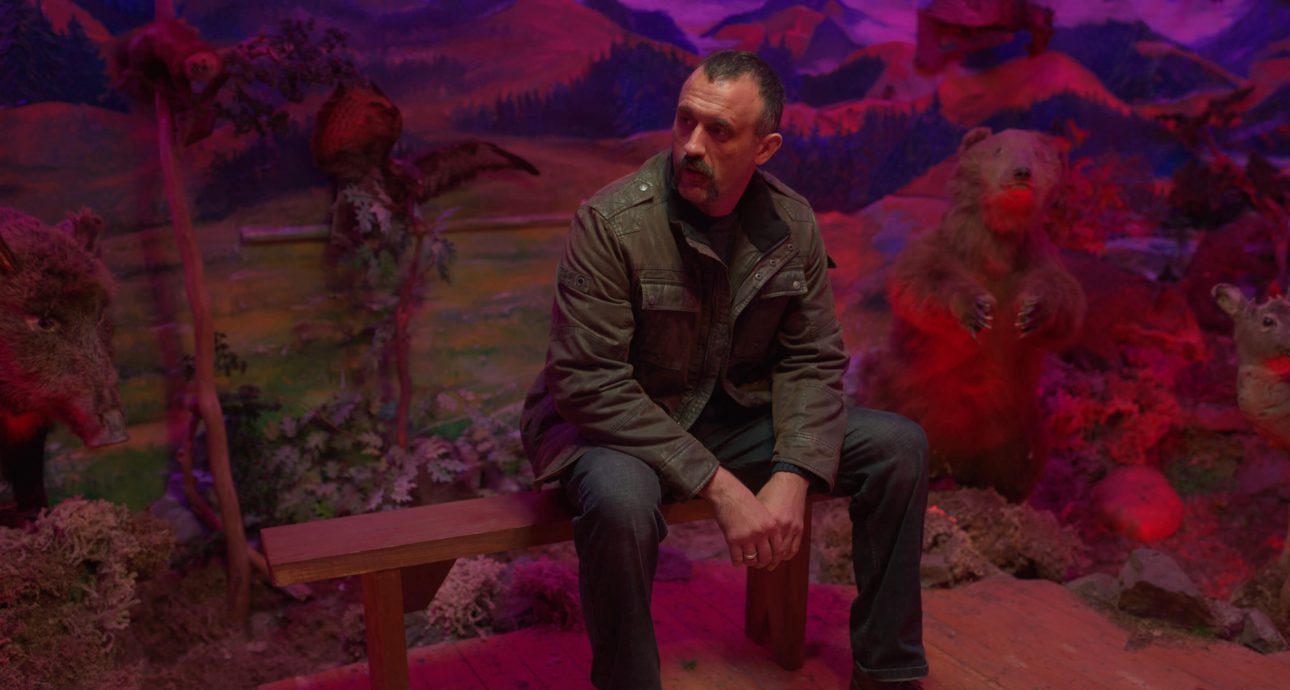
‘You Are Better off Sacrificing the Story Rather Than Spelling Everything Out’: Pamfir Director Talks About Working on the Film and Its Ending
Dmytro Sukholytkyy-Sobchuk was born in Ukraine. Initially an architect by trade, he later got another degree — in philosophy. Having switched professions a few times, he ended up joining the film industry. Over the 15 years of his directorial career, he filmed five short films and one documentary.
Pamfir is Sukholytkyy-Sobchuk’s feature debut telling the story of a man nicknamed Pamfir, a breadwinner of his family returning home to his village after a long absence. Previously a smuggler, he makes every effort to stay away from his criminal past. Still, family circumstances force him to make a personal compromise.
The film took ten years to complete, with Dmytro Sukholytkyy-Sobchuk changing the picture’s ending and the protagonist’s character in the process. Still, the result was worth it. The film was well-received at the Cannes Film Festival’s Directors’ Fortnight as the cast’s performance and camerawork got a lot of praise.
The reviews were generally favourable, albeit with a bit of criticism for its rushed ending. Bird in Flight asked the director about viewers’ complaints and found out how he managed to film one of the most solid present-day Ukrainian pictures.
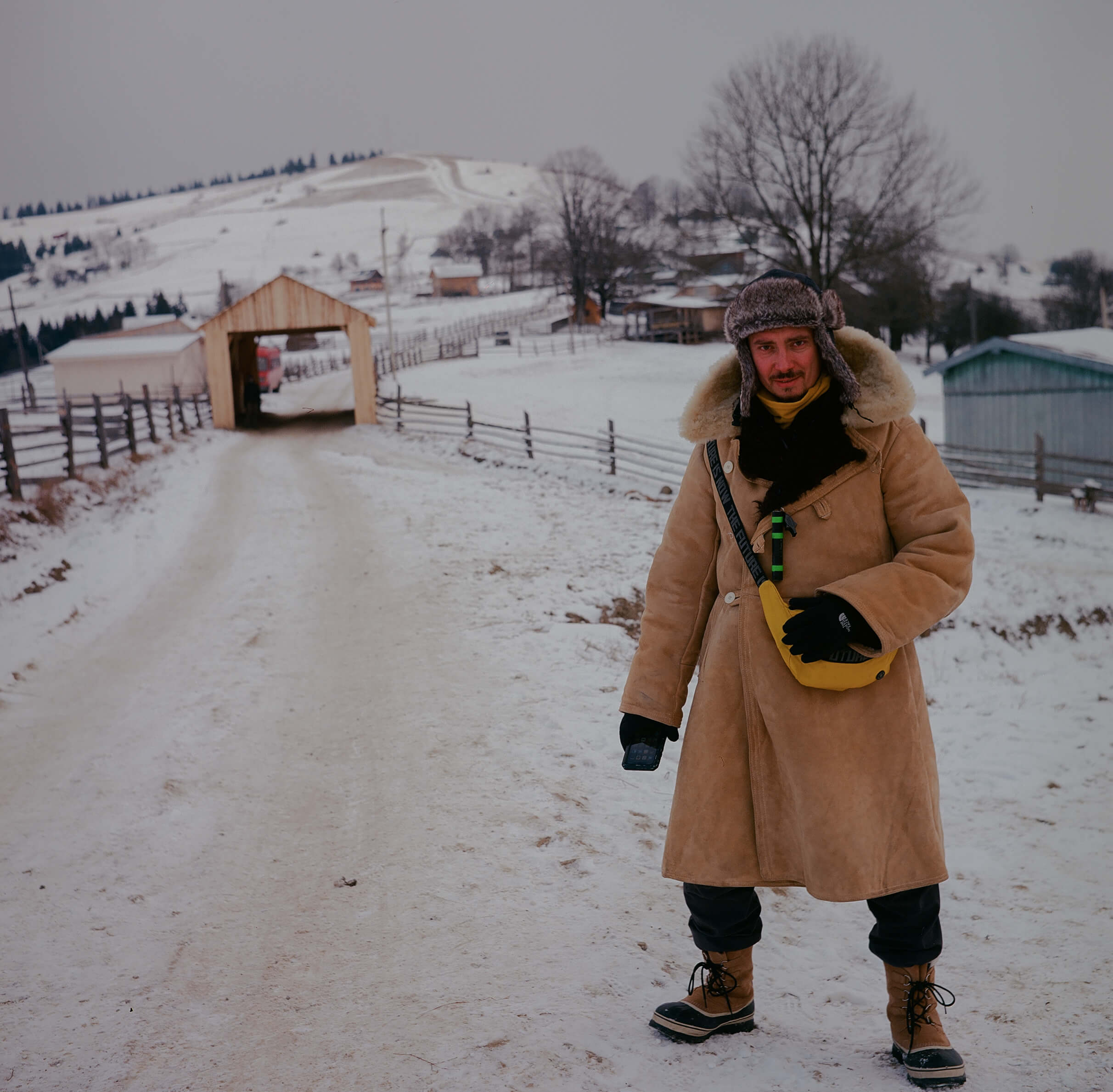
Dmytro Sukholytkyy-Sobchuk on the film set of Pamfir
Your first degree is in architecture. How come you ended up in the film industry?
I wanted to create something exciting, but I didn’t know what exactly my occupation would be. I had good grades in three subjects at school: art, drawing, and Ukrainian/world literature. Writing has always been a challenge for me, equally so then and now. Therefore, I chose architecture. I graduated, worked in a company for a while, and understood that architecture was not my cup of tea. So I entered the Philosophy and Theology Faculty of the Chernivtsi National University. Becoming a philosophy instructor wasn’t my ambition. Rather, it was a place where I decided on my next steps. So, filmmaking was my next stop. It took me ten years to arrive there and another ten to film my feature debut.
Pamfir received a standing ovation at the Cannes Film Festival. How did it make you feel?
I didn’t expect such a reaction. However, it was the only premiere in my life where I didn’t feel nervous at all.
Did you have much confidence in your film becoming a hit?
Not at all. My being in Cannes resulted in a dissonance between what I felt because of the war and what I saw around me. I was absolutely detached.
Pamfir is essentially the first Ukrainian film in many years to have actors who look very organic on the screen. How did you achieve that?
We rehearsed. I pay very much attention to rehearsals. We had four and a half months of them for Weightlifter (a short by Sukholytkyy-Sobchuk released in 2018 — Editor’s note). In the case of Pamfir, I helped some actors prepare for shooting for over a year, setting tasks, talking them through their characters’ bios, and working with them on pronunciation.
Besides, a lot of attention was given to inhabiting the role. Only the camera crew and I were allowed to talk to the actors on the film set. Even outside of shooting, the actors addressed one another by their characters’ names.
Only the camera crew and I were allowed to talk to the actors on the film set.
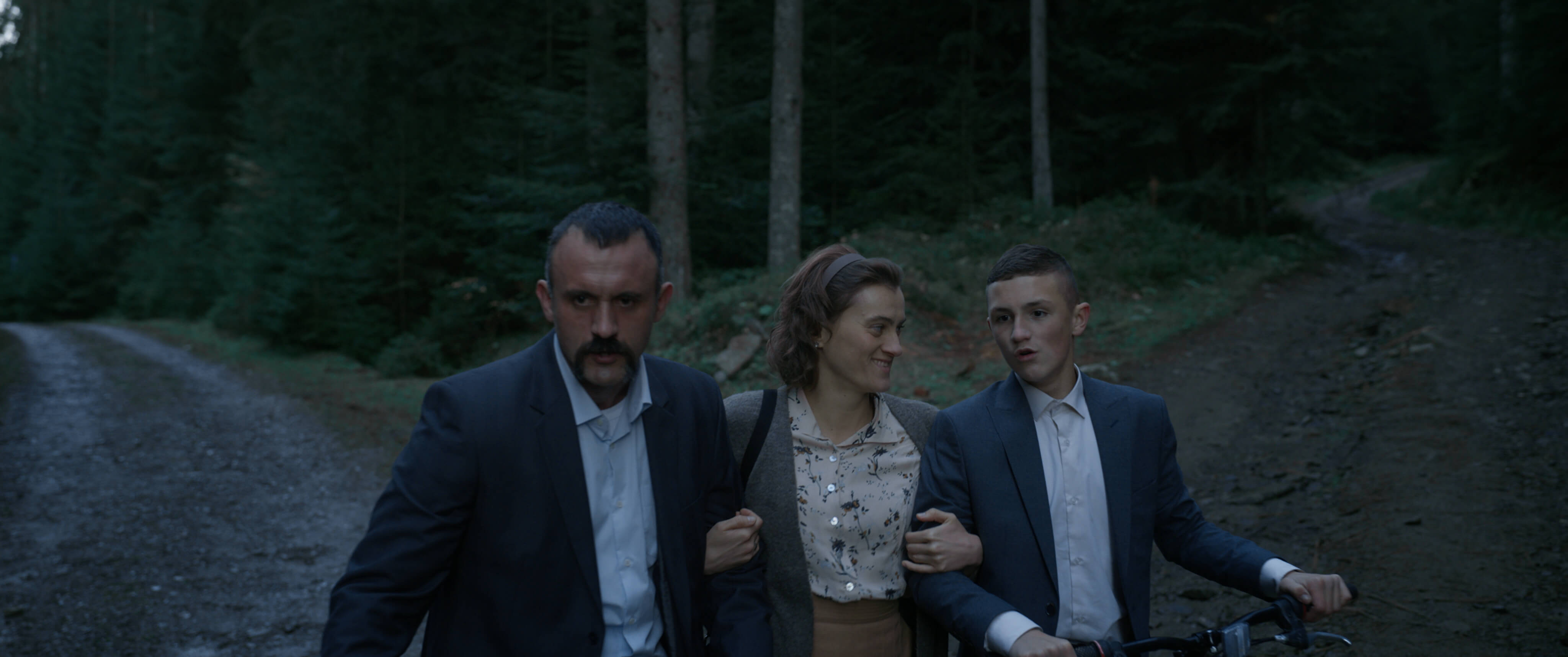
Pamfir (Oleksandr Yatsentyuk), his wife Olena (Solomiya Kyrylova), and their son Nazar (Stanislav Potiak). A still from Pamfir
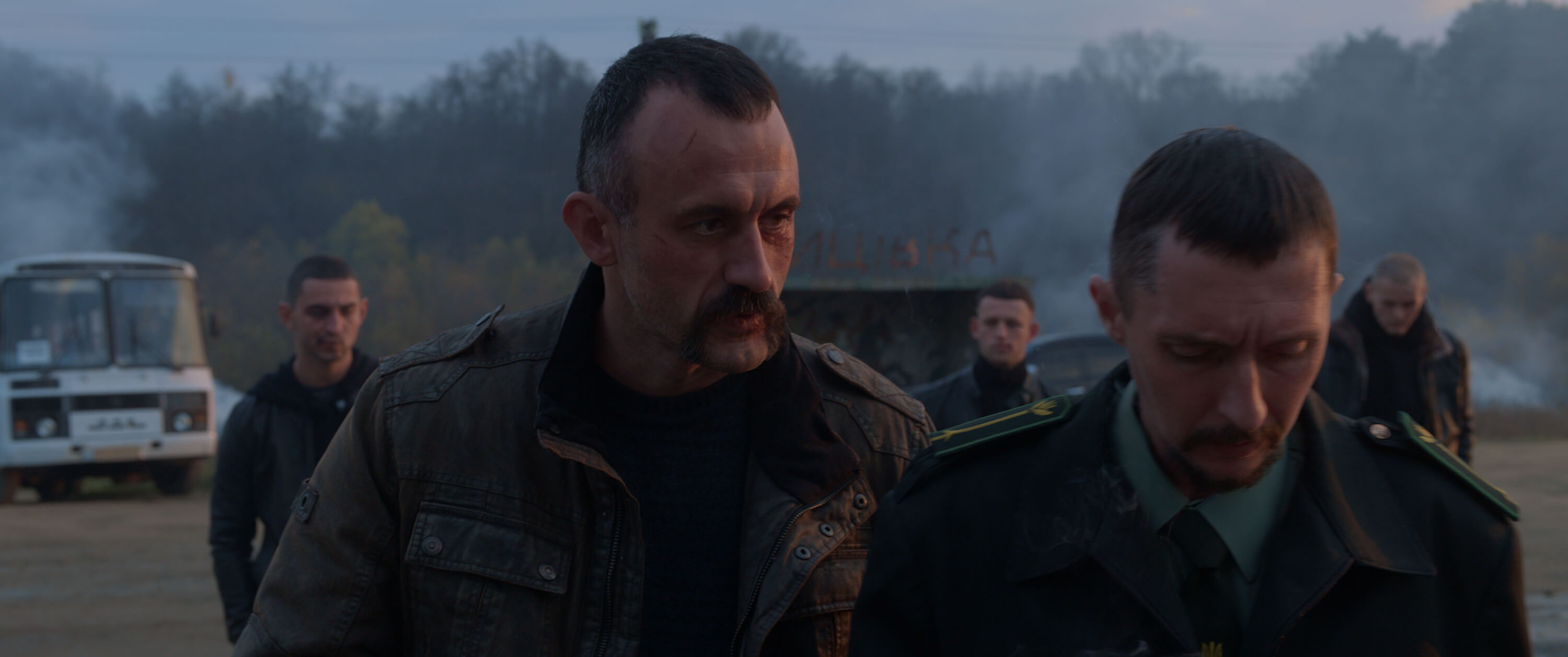
Pamfir (Oleksandr Yatsentiuk) with his classmate (Petro Chychuk). A still from Pamfir
How long did the casting take?
It took two years.
Who was the hardest to find?
Oleksandr Yatsentyuk and Stanislav Potiak (playing the parts of Pamfir and Nazar, respectively — Ed. note).
Who auditioned for these parts?
I’ll keep that to myself for ethical reasons. What I can say is there were a lot of candidates.
I happened to like an actor in a theatre once. Someone introduced me to him, and we talked a little. Later I realized he didn’t fit the part for lack of rebel energy. Another candidate surfaced, and he was kinda OK. However, I ended up altering the protagonist’s personality from submissive to defiant and had to look for some other Pamfir.
How many script variants did you have?
Three.
The first had Leonid (Pamfir, the film’s protagonist — Ed. note) submit to everything that happened in his life. It took us one reading to understand that if a character doesn’t put up a fight, he or she doesn’t fully develop.
If a character doesn’t put up a fight, he or she doesn’t fully develop.
On one occasion, you said one script variant had Pamfir lose his son. When and how did it happen?
It happened during the ending portion of the film. That variant envisioned the protagonist losing everything, including his son.
Why did you discard this plot twist?
A script is about the time you inhabit. While I worked on the script drafts, the times changed, and I had to catch up. Overall, making a film about the present day is hard because it’s a very time-intensive process.
Changing the ending didn’t affect the gist of the story. How did it help you catch up?
With the script draft in which Nazar died, I was trying to say our society was doomed. However, Maidan happened soon after I finished it. Our society changed, so I rewrote the ending to convey the idea that everything old eventually dies out and that there is hope for the new generation. I wanted to say we were not doomed but had a chance.
Pamfir lives in the pre-COVID reality. Aged about 35–38, he does not necessarily belong to the older generation. However, everything about his views is traditional, so they don’t work. Remember the film’s final scene, with Nazar turning his back to the viewer and his past and facing toward whatever the future holds.
So, you don’t leave any chance to people like Pamfir?
Let’s put it this way: I doubt him. I leave no chance to Morda’s generation (One of the film’s antagonists — Ed. note), though.
I doubt Pamfir, but I leave no chance to Morda’s generation.
How did you get the insider info about the medications acting as stimulants and giving erections?
While working on the script, I often talked to border guards and smugglers. The latter told me about the medications. We are talking about 2011–2012 when the guys drank Red Bull and took stimulants that gave erections as a side effect. Also, they trained their legs and backs in the gym to do two buttlegging runs at a time.
Have you ever accompanied smugglers crossing the border?
I haven’t, but they did show me the trails.
Smuggling is a process that involves a lot of people. Those who move cigarettes through the tunnels are called ‘teckels’, and those carrying the contraband on their backs are ‘camels’. There are also ‘stakeouts’ who wander the woods with a walkie-talkie, keeping tabs on border guards. On the Romanian side, there are ‘mushroomers’. Their function is similar to that of the stakeouts. They pretend to be mushroom gatherers during the mushroom season and pose as hunters during the hunting season.
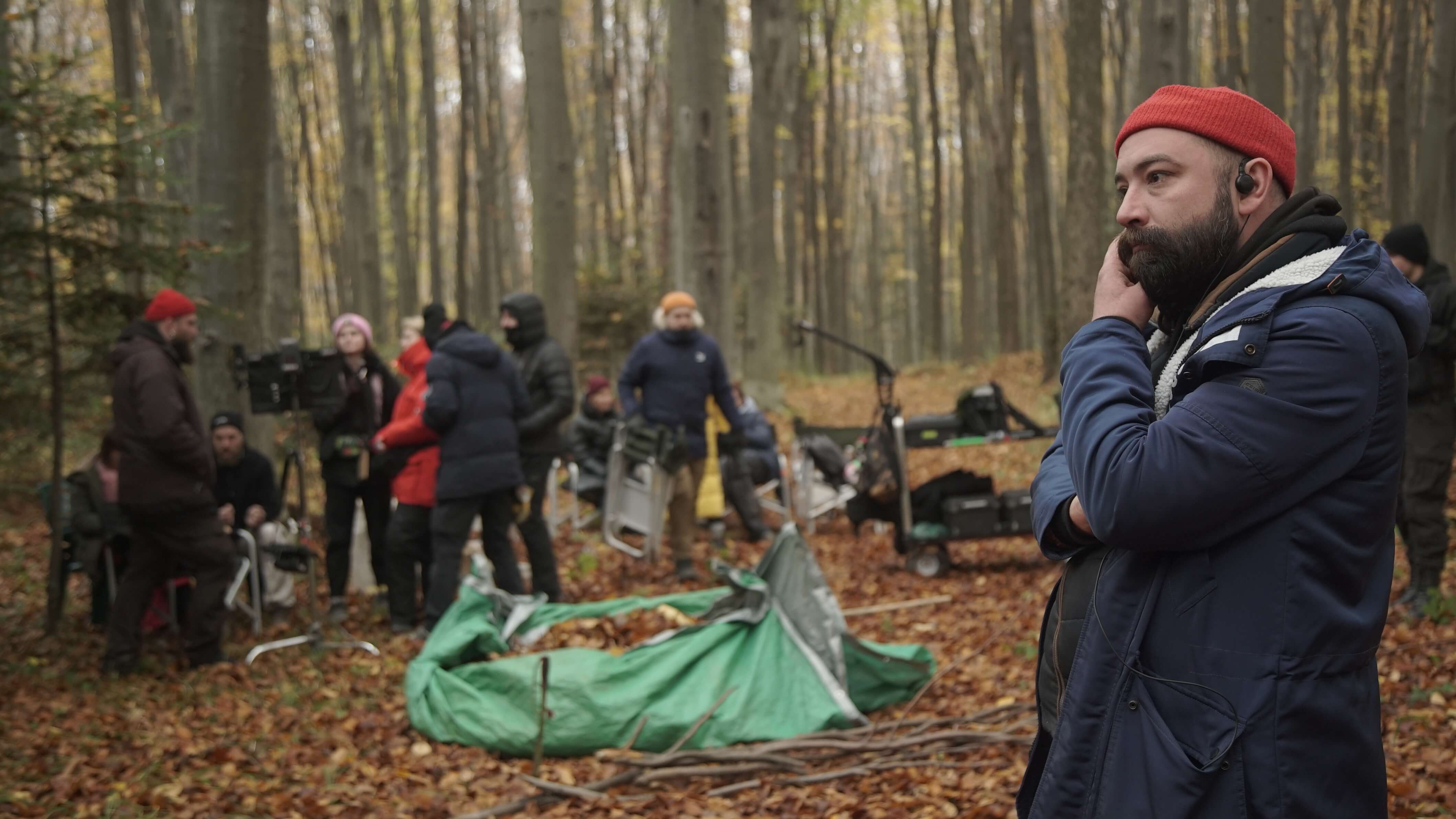
At the film set of Pamfir
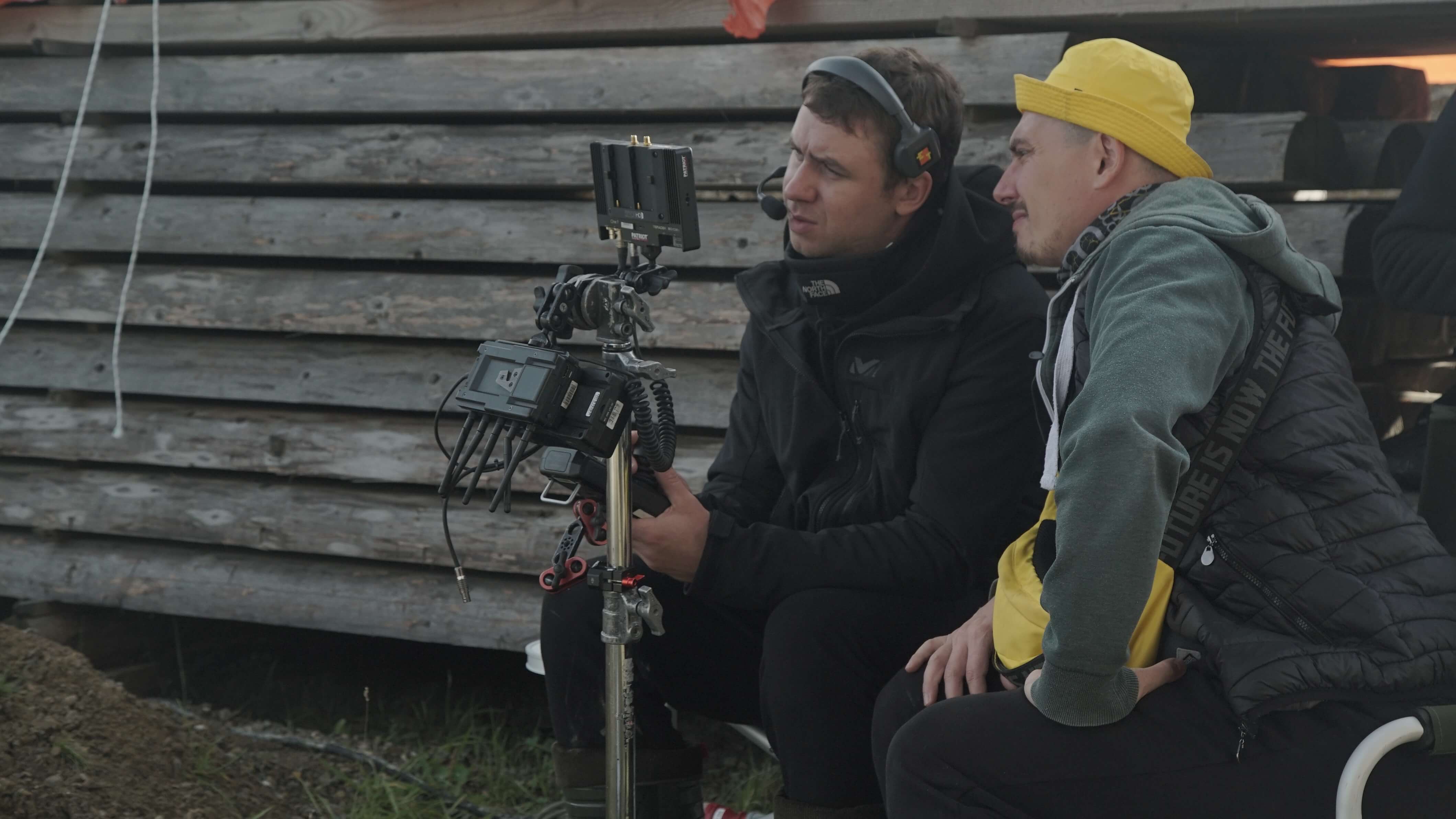
Pamfir Director of Photography Mykyta Kuzmenko (left) and Dmytro Sukholytkyy-Sobchuk on the film set
How do you like the reviews?
I refrain from reading them, but I find them funny if I do. Among the things that have made me laugh lately is a review by some journalist, who came so far as to suggest how my film should have ended. It wasn’t half bad, by the way.
Are you happy with the picture’s third act?
Yes, it’s perfectly aligned with what I envisioned.
I have questions about the film because I couldn’t understand a few things. First, why do border guards turn on Morda if he is so powerful?
Many fail to notice that Morda is not a border guard. He is a forest guard. He has no power over border guards, so he can’t keep everything under control.
I see. And how did Nazar manage to make a U-turn in the narrow tunnel?
The tunnel was wider at the entrance and became narrower toward the middle. In one of the film cuts, we had an episode that explained that.
The parents’ story arc is kinda sporadic. Is that intentional?
No, I had to cut it.
The first cut of the film ran at 2 hours and 18 minutes. It had a lot of things going on.
We know that Pamfir had a long-time conflict with his father — they fought over something, and his father lost an eye as a result. After that, they stopped talking to each other.
The bio of Pamfir’s father indicates that he worked in the local community centre. From there, he took an album with Soviet coins and a Lenin’s bust, which Leonid and Nazar used to create masks. That album is important to the film. When Pamfir went on a smuggling run, Nazar stole his grandfather’s album, committing a crime at the same time as his father. Nazar had to hide in his grandfather’s house to steal that album and waited for the gramps to unlock the door to get out. He managed to slip out, and everything looked OK until he got bitten by a big dog named Buran. His parents thus called Leonid, who had to come and pick up his son. The scene where Pamfir, his wife Olena, and his son, father, mother, and brother gather in the house was the only one in the film having those characters together in one room since Pamfir and his father fell out.
Then, Nazar says he will never come to visit because of Buran. His grandfather promises to get rid of the dog, to which Leonid replies, ‘Yeah, you promised it once’, insulting his father again. Eventually, the old man drowns Buran.
Having learnt that his son stole the album, Pamfir returns it. And then there is that beautiful scene in which Pamfir wants to talk to his father after the church service but never dares. They bump into each other in the forest later, but Pamfir still hesitates to speak. Only after that do Pamfir and his son visit the old man to return the album, which he confesses having stolen. This is where Pamfir makes up with his father.
In fact, while visiting his father, Pamfir asks his brother Viktor how to get into the tunnel and learns from him that the tunnel is wider at the opening and gets narrower where it goes through the hard rock.
So that’s it! Now I get it. What I don’t get is why you had to cut all of that.
We filmed the father’s arc, but it ended up working better in the script than on the screen. In the film, it felt just too sentimental.
The father arc worked better in the script than on the screen.
What’s wrong with sentimentality?
It’s too unambiguous.
However, without these episodes, the ending feels rushed, doesn’t it?
Maintaining genre purity is more important to me. The protagonist had to remain a tragic character. Unfinished business makes a more tragic character. However, with the parents’ arc in place, it seemed like he tied all loose ends.
While editing the picture, I saw that some things were lacking. However, this imperfection is much more acceptable to me than sentimentality and explanations for everything. I’d rather sacrifice the story’s logic than spell everything out and make a sentimental film.
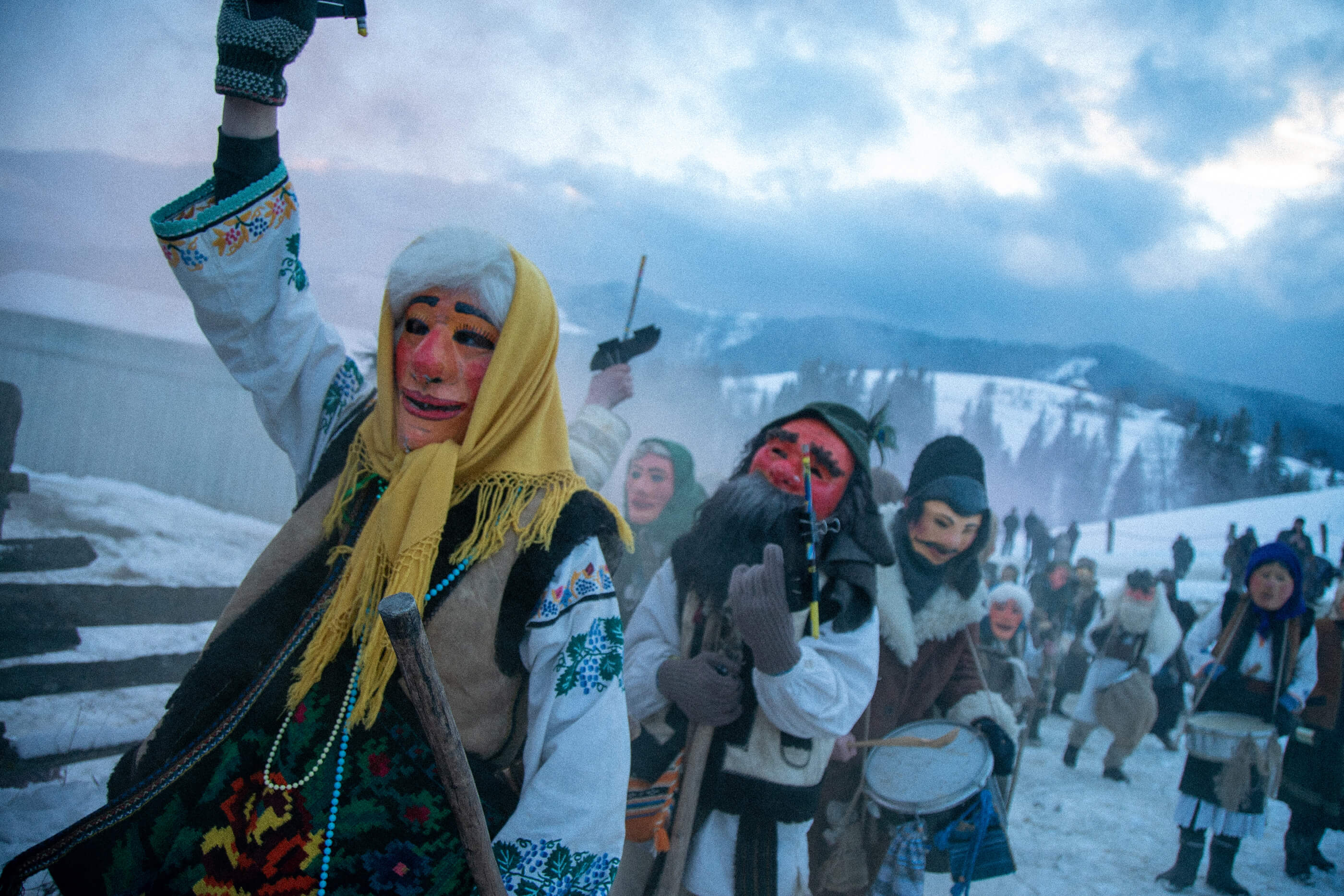
At the film set of Pamfir
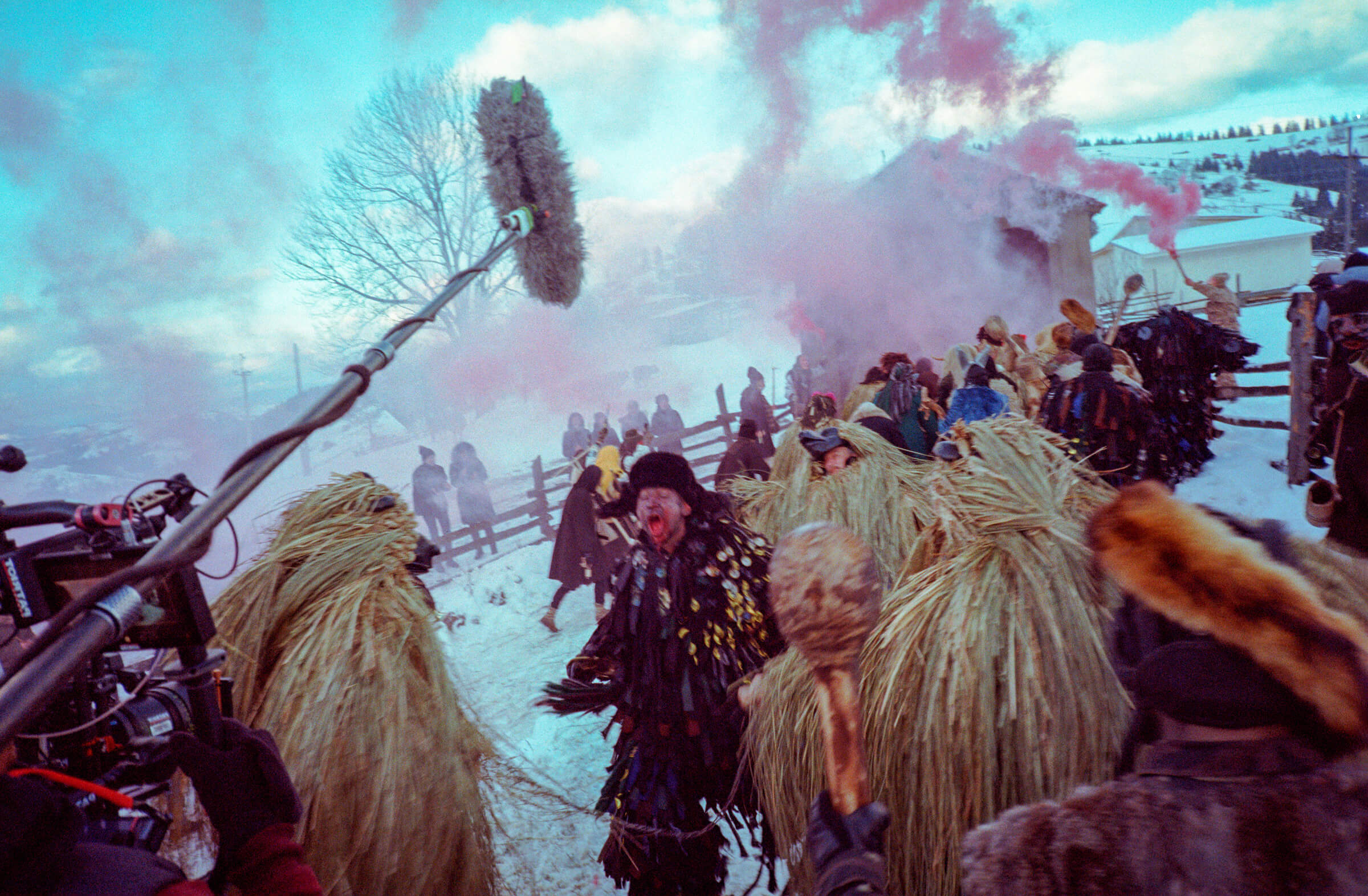
At the film set of Pamfir
Another thing your film is criticized for is its pessimistic take on Ukrainian reality. Admittedly, most of the notable present-day Ukrainian films are pretty grim, to put it mildly. The Tribe, Homeward, and Bad Roads are prime examples of that. Why shoot another one about how everything is wrong in Ukraine?
The pictures you mentioned were filmed by people the same age as me. In their work, they reflect on how we perceive the time and environment where we live.
Don’t you think these reflections dismiss one of cinema’s main functions — entertaining the viewer? Aren’t films supposed to distract us from the mundane reality, even if a little?
It’s a shame everything boils down to that one aspect of it.
It doesn’t. However, it’s still important, isn’t it?
As I see it, popcorn flicks are too much mass culture. It’s not the kind of film I’m interested in making. I’m more after the things that make cinematography an art.
Can’t art be entertaining? Tarantino entertains as much as Charlie Chaplin. Meanwhile, their films are art pieces in their own right, aren’t they?
OK, let me rephrase it. I’m interested in making less entertaining art. To reiterate, I don’t want to entertain the viewers. I want to shatter their expectations.
What expectations did you shatter with Pamfir? Don’t we know already that life is hard? People have to go abroad or earn a living as smugglers. Isn’t it time to give people some hope besides shattering expectations?
It returns us to what I’ve already said. Directors reflect on the time they live in.
Besides, I wouldn’t go as far as to say that Pamfir is about painting Ukraine black. Rather, it demonstrates the corruption we have in the peripheral regions of Ukraine. And even then, it’s highly debatable if everything is that bad.
After one screening, a PD told me the situation had long been much different from what I depicted in the film, while an activist from Chernivtsi who approached me later said, ‘You have shown the things as they truly are’. It’s excellent that corruption has been overcome in some places, but it needs to be overcome everywhere. When activists willing to defend their rights come to that place, such people as Morda will disappear.
After one screening, a PD told me the situation had long been much different from what I depicted in the film.
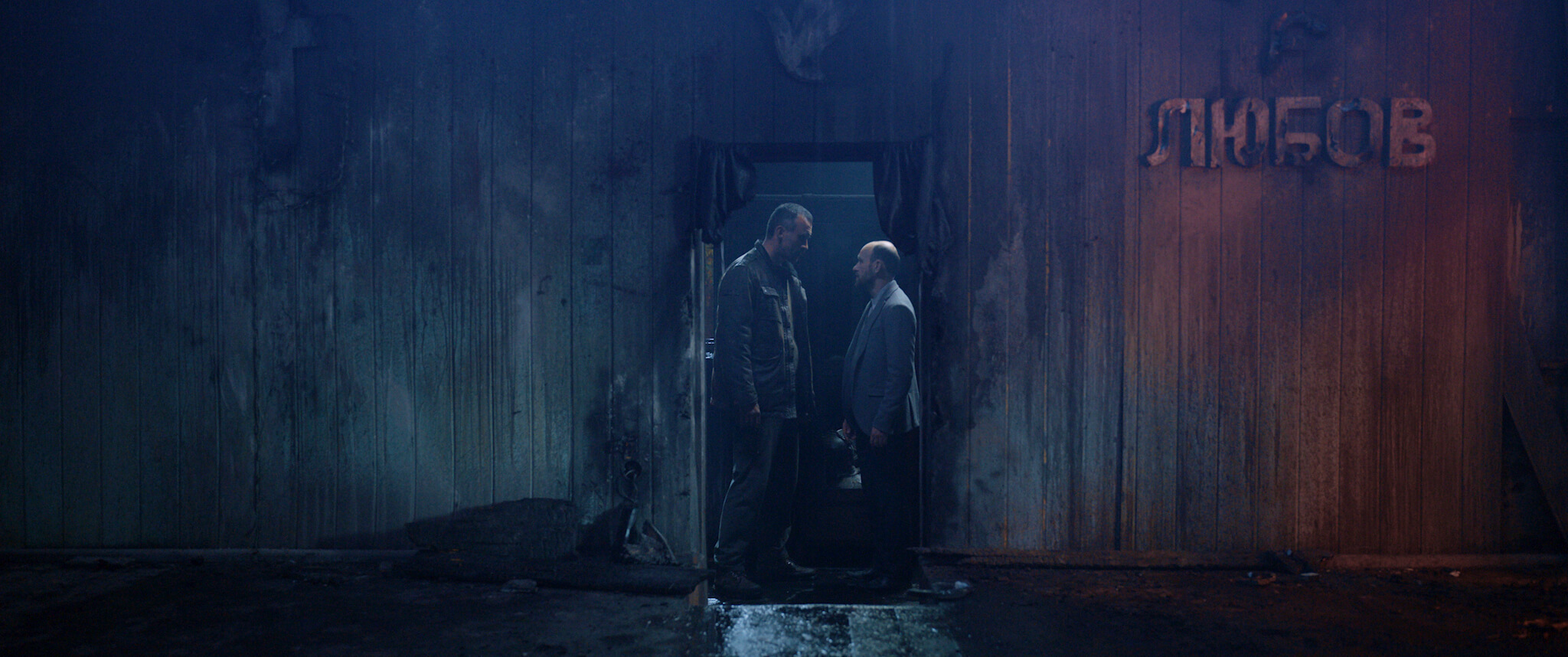
Pamfir (Oleksandr Yatsentiuk) and pastor Andrii (Ihor Danchuk). A still from Pamfir
The rumour has it Stanislav Potiak and Oleksandr Yatsentiuk got really close on the set. Stanislav even burst into tears when Oleksandr finished filming and left. Is that true?
It is.
It was essential to me that the actor playing Pamfir had children, and Oleksandr’s son is only a bit older than Nazar.
Stanislav lives with his mother and stepfather. At that point, he hadn’t seen his biological father for three years. Meanwhile, Oleksandr couldn’t visit his son, who was abroad, because of COVID-19 regulations. I think they sublimated what they were going through on the screen.
Stanislav’s tears were the result of my provocation. Oleksandr finished filming his scenes earlier than Stanislav. He announced his departure. Behind Stanislav’s back, I asked him to stay for two more days, albeit vacating the room where he stayed. Oleksandr agreed to play along. He bid goodbye to the crew but stayed.
In the ending scene, Stanislav’s character had to look like he cried his eyes out, not just wept. We rehearsed it in the room where Oleksandr used to stay. At the sight of the empty room, Stanislav realized his colleague was gone. It made him miserable. He played the final scene as if he was devastated by grief.
So you arranged everything for him to give a convincing performance?
This was my job.
Now, the last question. What happened to Nazar?
I’m sure he went back to studying. Nazar might be graduating from the university by now.
You mean, it’s almost a happy ending?
It’s more of a vitality prevailing thing.
According to one survey, 90% of young people are ready to help rebuild our country. Just imagine that! New challenges await us, but I believe in this generation!
Cover photo: a still from Pamfir. Photo credit: Pamfir press service
New and best




